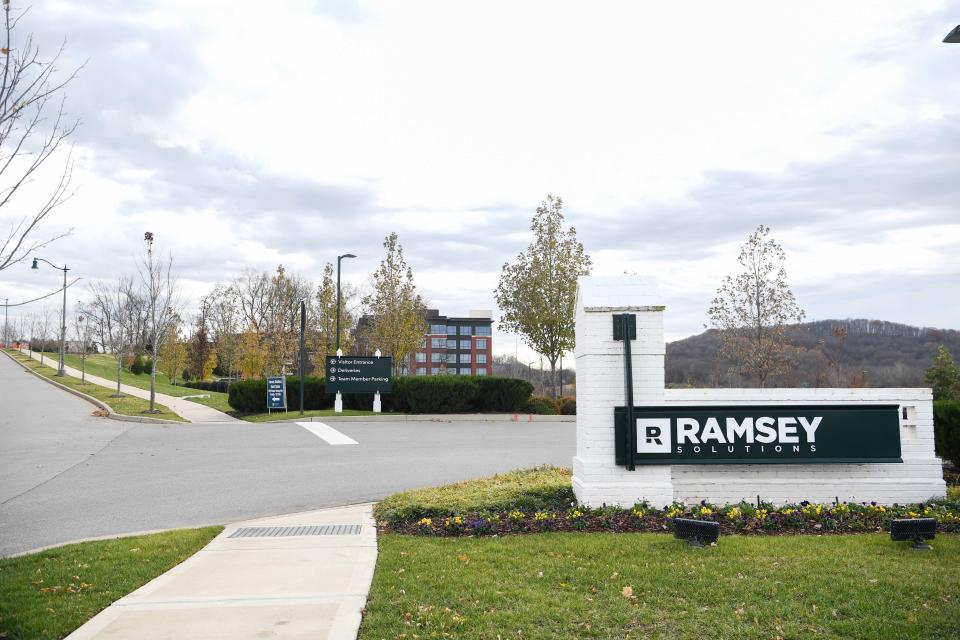Religious discrimination case against Dave Ramsey's company over COVID policies dismissed
A federal judge rejected a religious discrimination case against personal finance guru Dave Ramsey and his company that sought to challenge the Franklin-based employer’s COVID-19 response and ensuing personnel conflict.
U.S. District Judge Eli Richardson in Nashville dismissed claims that Ramsey Solutions violated state employment law and federal protections for religious beliefs for firing employee Brad Amos, who protested the company’s lax public health practices. Amos said his opposition was also religious in nature.
The Wednesday decision addresses one, though not all, of the major disputes for Ramsey and his media empire over religious freedoms. The private corporation has settled or still faces other lawsuits, including an ongoing case about executives’ religious beliefs dictating rank-and-file employees’ personal conduct.
Ramsey, a prominent evangelical Christian figure, has come under fire in recent years for his dismissive attitudes toward COVID-19 public health guidelines and employees’ grievances about an intense work culture. Ramsey was a defiant voice against masks, criticizing the precaution on his nationally syndicated radio show, and his company held a Christmas party for hundreds despite guidance against large gatherings at the time.
Ramsey Solutions, comprised of 1,000-plus employees, required staff to return to work in-person in May 2020, far earlier than most companies due to Centers for Disease Control and Prevention advisement and Gov. Bill Lee’s executive orders. When Amos pushed back, Ramsey and other supervisors allegedly responded with “Pray and move forward” and “God helps those who help themselves,” according to the court documents. Amos cited his own faith to make his case for working remotely.
During that time, the company demoted Amos and eventually fired him in July. Subsequently, Amos sued Ramsey Solutions for violating the Tennessee Public Protection Act for workplace retaliation and Title VII, the federal law prohibiting employment discrimination based on religion. But Richardson said neither argument holds up.
“Any employee that could claim a religious-based grounding for his or her chosen course of action could claim religious discrimination based on the employer’s insistence on different conduct,” Richardson said about Amos’ religious discrimination claim.
Title VII antidiscrimination protections apply to conduct directly related to an employees’ religious belief. Referencing a Pennsylvania judge’s ruling in a 2017 religious discrimination case over someone’s opposition to vaccination, Richardson said Amos’ stance on Ramsey Solutions’ COVID policies lacks enough basis to qualify as protected religious conduct.
The judge “is not purporting to be the final arbiter on ‘religion,’ on what beliefs can be ‘religious,’ or on what beliefs are ‘Christian,’” Richardson said in his opinion. Rather, Amos' “claim is conclusory and devoid of factual matter supporting the claim that this belief set is ‘religious.’”

Also, Amos’ claim about the Tennessee Public Protection Act, which protects employees from workplace retaliation based on an employer’s “illegal activities,” falls short of the standard. “Any such ‘violations’ would have been of recommendations rather than legal requirements, and thus would not constitute ‘illegal activities,’” Richardson said, referencing Ramsey Solutions’ in-office requirement despite federal and state advisories.
Yet the biggest question raised by Amos’ case — the clash between company leaders’ religious views and employee conduct — remains alive and well for Ramsey Solutions.
In an ongoing gender discrimination case in federal court, former employee Caitlin O’Connor is challenging Ramsey Solutions’ “righteous living” policy over the company’s decision to fire O’Connor after learning she was pregnant and not married. The company settled another federal discrimination case over allegedly pressuring former employee Julie Anne Stamps to resign after Stamps came out as lesbian.
More recently, though unrelated to his religion, Ramsey is facing a class action lawsuit over endorsements for a timeshare exit company alleged of defrauding customers.
Neither attorneys for Amos or Ramsey Solutions responded to requests for comment.
Policies, religion in-depth analysis: Dave Ramsey's 'righteous living': Inside the conflict over religion and sexuality at Ramsey Solutions
Liam Adams covers religion for The Tennessean. Reach him at ladams@tennessean.com or on social media @liamsadams.
This article originally appeared on Nashville Tennessean: Dave Ramsey religious discrimination case dismissed by Nashville judge

